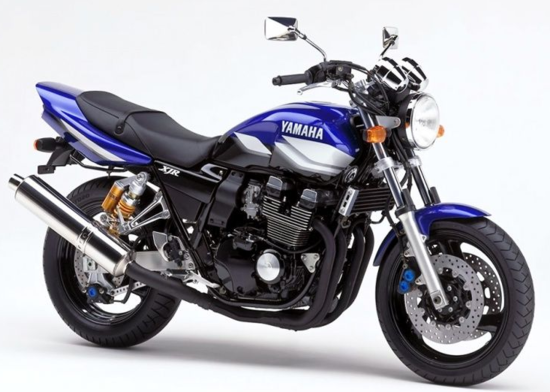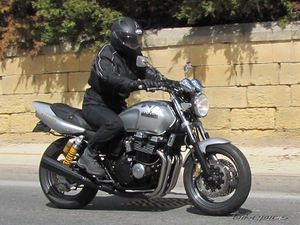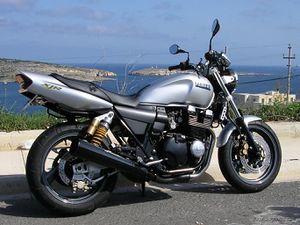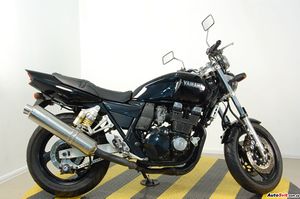The Yamaha XJR400 was first introduced in 1993 for the Japanese domestic market and lasted until 2009. Initially, the model had a fairly simple equipment and did not stand out from its competitors, but over time it underwent a number of restyling and received a number of technical advantages.
In 1994, the model changes its name, adding the letter S - Yamaha XJR400S. The updated version receives more advanced engine and carburetor settings, which increases the torque figure from 34 to 38 Nm. In addition, Ohlins rear suspension is standard.
In 1995, the simple 2-piston brakes were replaced by new gold-colored Brembo 4-piston calipers. The model changes its name to - Yamaha XJR400R.
In 1996, a limited edition `` Yamaha XJR400R2 appears, which features a front fairing with rectangular headlights, a digital instrument panel and a black silencer. This version did not have much demand, and therefore was discontinued the same year.
In 1998, the design of the dashboard was changed, the engine was silver, and the fuel tank capacity increased from 18 to 20 liters.
2001 also brought another update to the Yamaha XJR400, replacing the Brembo calipers with new Nissin Sumitomo calipers from the sporty Yamaha YZF-R1 (1998-2001).
For 2004, the model receives changes in ignition and exhaust settings, which generally increase acceleration from low and medium revs. Also, the motorcycle is equipped with an immobilizer system.
In 2008, the end of production of the Yamaha XJR400R was announced due to the release of updated environmental regulations that the motorcycle did not comply with. However, the official sales of new motorcycles continued in 2009.
Currently, the Yamaha XJR 400 model is widely represented at Japanese auctions and is one of the most affordable motorcycle options for beginners in Russia. Rich equipment, coupled with a simple air engine and a low price, clearly distinguish the XJR400 from other more popular competitors.
Yamaha XJR Series Lineup:
- Yamaha XJR 400
- Yamaha XJR 1200
- Yamaha XJR 1300
The main competitors of the Yamaha XJR400 in the class:
Photos
Specifications
Specifications Yamaha XJR 400:
| Model | Yamaha XJR 400 |
|---|---|
| Motorcycle type | road |
| Release year | 1993-2008 |
| Frame | steel tubular |
| Engine type | 4-cylinder, 4-stroke, in-line |
| Working volume | 399 cm³ |
| Bore / stroke | 55.0 x 42.0 mm |
| Compression ratio | 10.7: 1 |
| Cooling | air |
| Number of valves per cylinder | DOHC, 4 valves per cylinder |
| Fuel supply system | carburetor, 4x Mikuni BSR30 |
| Ignition type | digital TCI |
| Maximum power | 53.0 h.p. (39.0 kW) at 11000 rpm |
| Maximum torque | 34.3 Nm (3.5 kg-m) @ 9500 rpm - XJR400 (1993)
38.2 Nm (3.9 kg-m) @ 9500 rpm - XJR400 (1994-2008) |
| Gearbox | 6-speed |
| Drive type | chain |
| Front tire size | 110 / 70-17 (54H) |
| Rear tire size | 150 / 70-17 (69H) |
| Front brakes | 2 discs, 298mm, 2-piston caliper - XJR400 (1993-1994)
2 discs, 298mm, 4-piston Brembo calipers - XJR400 (1995-2000) 2 discs, 298mm, 4-piston calipers Nissin Sumitomo - XJR400 (2001-2008) |
| Rear brakes | 1 disc, 245 mm, 2-piston caliper |
| Front suspension | 41mm telescopic fork, 130mm travel |
| Rear suspension | linkage with two shock absorbers (preload adjustment), stroke - 110 mm |
| Motorcycle length | 2075 mm |
| Motorcycle width | 745 mm |
| Motorcycle height | 1080 mm |
| Wheelbase | 1435 mm |
| Saddle height | 770 mm |
| Acceleration to 100 km / h | 5.0 sec |
| Maximum speed | 180 km / h |
| Fuel tank capacity | 18.0 L (including reserve - 3.0 L) - XJR400 (1993-1997)
20.0 L - XJR400 (1998-2008) |
| Motorcycle weight (dry) | 175 kg |
| Motorcycle weight (curb) | 195 kg - XJR400 (1993-1997)
198 kg - XJR400 (1998-2008) |
Documentation



